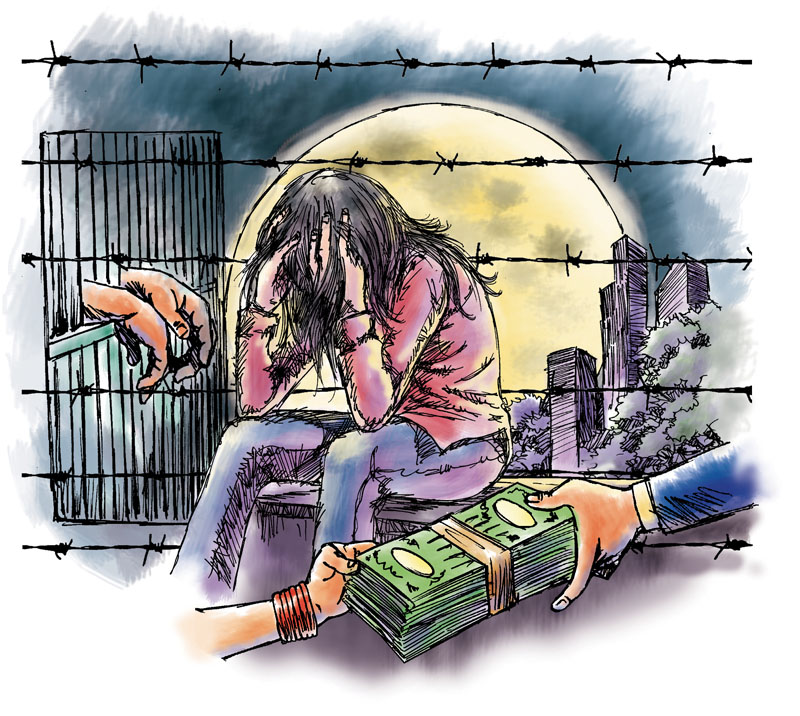Anti-trafficking society: Voice for the voiceless
Nepal doesn’t have a concrete repatriation policy. So we are not able to repatriate the rescued girls and women to our country. Due to lack of a repatriation policy, we face great challenge in rescue, repatriation, rehabilitation and reintegration
Trafficking for sex captures everyone’s attention because it is a violation of human rights and a shame to humanity. Every citizen deserves a free and dignified life. But thousands of young girls and women are trapped into sexual slavery every year under different pretexts.
The scenario of human trafficking has changed in recent days because of globalisation. It has created a clandestine global network through advance technology and communication. On the other hand, it has also helped push for a global network of civil societies that exert pressure globally to implement the laws related to the rights and justice of each individual.
The problem is acute globally because no society is free from human trafficking, whether it is a country of origin, country of transit or the country of destination. There are millions of women who are illiterate worldwide, especially in the rural areas.
So they are vulnerable to being trafficked because they can be easily swindled by perpetrators promising a good job in the country or beyond. Poverty, illiteracy, unemployment, gender-based violence, political instability, geographical structure and natural disasters are the factors driving sex trafficking.
Apart from them, many educated girls from the cities are also trafficked, lured by promises of good foreign employment or fake marriages.
In recent days, the common trend of sex trafficking has changed even in countries like Nepal. In the past, most of the Nepali girls and women used to be trafficked to India through the open border.
However, they are trafficked to three areas now: cross-border trafficking to India; cross-border trafficking beyond India to countries of the Middle East and Africa; and internal trafficking, mainly in the entertainment business, such as eateries, bars and pubs.
Gender-based discrimination is one of the determining factors behind sex trafficking in our patriarchal society. Discrimination begins from the womb to the tomb because the birth of a son is still preferred in Nepali society.
Girls face discrimination from their birth because of the stereotypical image as being weak, shy, dependent and powerless. The males are ravishers of the females, who force them to be silent and dull.
Justice isn’t transparent, and the culprits are the leaders and the police themselves. Humanity is also on the wane because many girls and women have been raped by their own fathers and brothers.
Education is a basic human right. Girls’ education not only empowers the family but also the community and economy. It is our social responsibility to be a voice to the voiceless. In addition, education is a means of enlightenment and key to success in life. It helps establish our autonomous identity and evaluate what is good and bad. So they have less chance to be cheated.
Therefore, the government should empower the youth and implement a strong policy to educate girls like boys in the rural areas, too. Similarly, an awareness campaign should be launched and financial initiatives provided to the poor families, which will gradually help to reduce sex trafficking.
Because of the weakness of the family protection mechanism, crime, rape and abuse are increasing in society. Because of insufficient human resource, budget and a weak security system, different types of crimes are increasing.
Trafficking and migration are interrelated because migration is the cause of trafficking. Mainly the displaced rural, indigenous and dalit women and girls are more prone to be trafficked because of the poor economic condition of the family and inability of the government to fulfill the basic rights of every
citizen.
However, cases of trafficking are under-reported for fear of retaliation. No one knows the exact number of girls who have been trafficked to different destinations. Hence, the government should take ownership and create a proactive state mechanism to combat human trafficking.
Nepal doesn’t have a concrete repatriation policy or act. So we are not able to repatriate the rescued girls and women to our country. Due to lack of a repatriation policy, we face great challenge in rescue, repatriation, rehabilitation and reintegration. Likewise, the anti-human trafficking policy and act are not effectively implemented. Therefore, our own citizens, who are rescued, are not able to return to their homeland.
A year and a half back, 17 Nepali girls, under 18, were rescued from a brothel, and eight of them were given shelter at Sanskar Ashram in India. But recently, the eight Nepali girls went missing from the Ashram, prompting fears that they might have been re-trafficked.
There are many organisations working in Nepal to prevent human trafficking, but despite their efforts, they were unable to repatriate the eight girls for lack of a concrete repatriation policy of the Nepal government. If it is difficult to repatriate rescued girls from India, one can well understand the plight of Nepali women in the Middle East or African counries.
Hence, the government should formulate a strong repatriation policy and implement it as soon as possible. Apart from that, it is the role and responsibility of the government to implement a strong law enforcement mechanism, border protection mechanism, youth empowerment mechanism and raise awareness to combat human trafficking.






